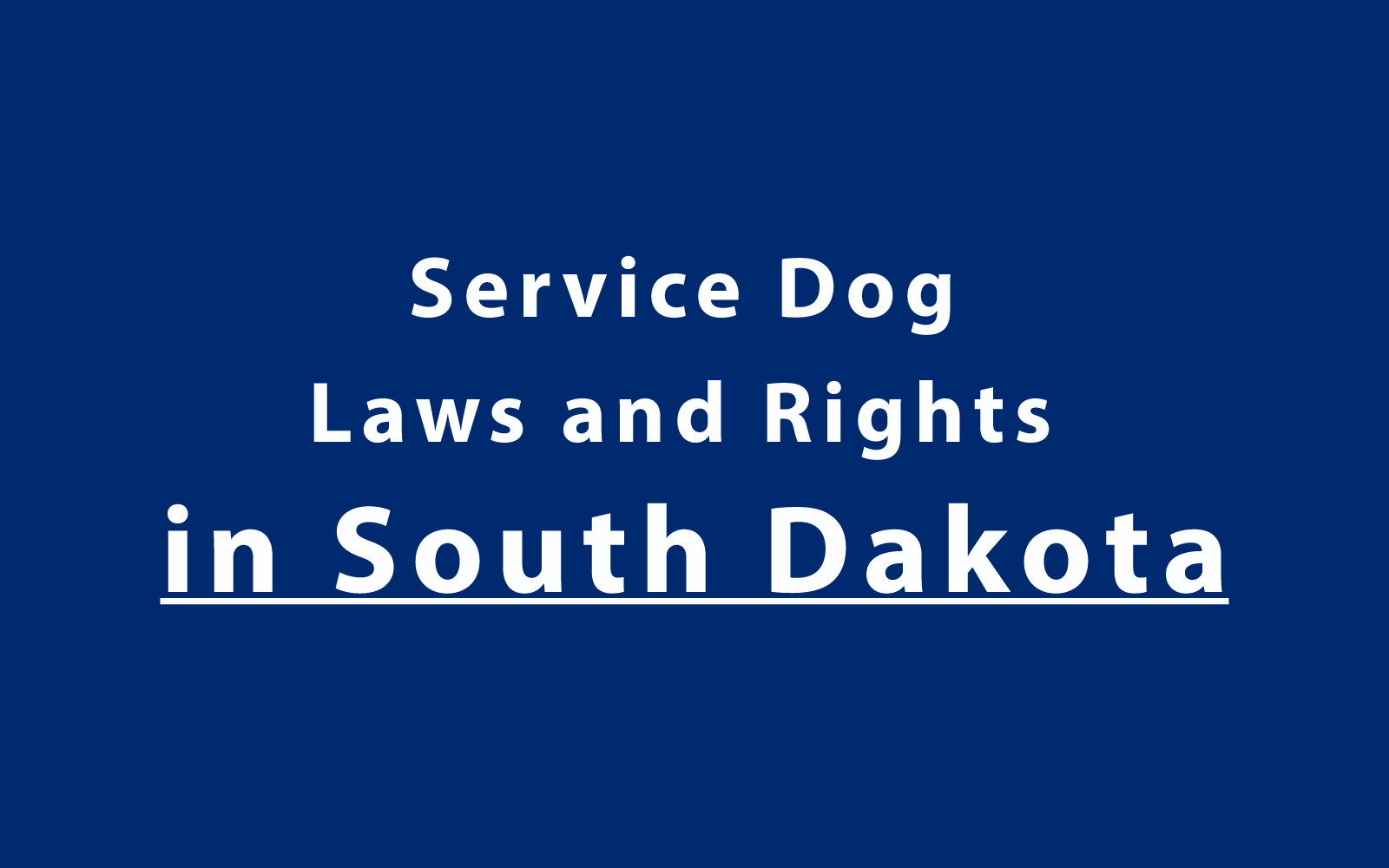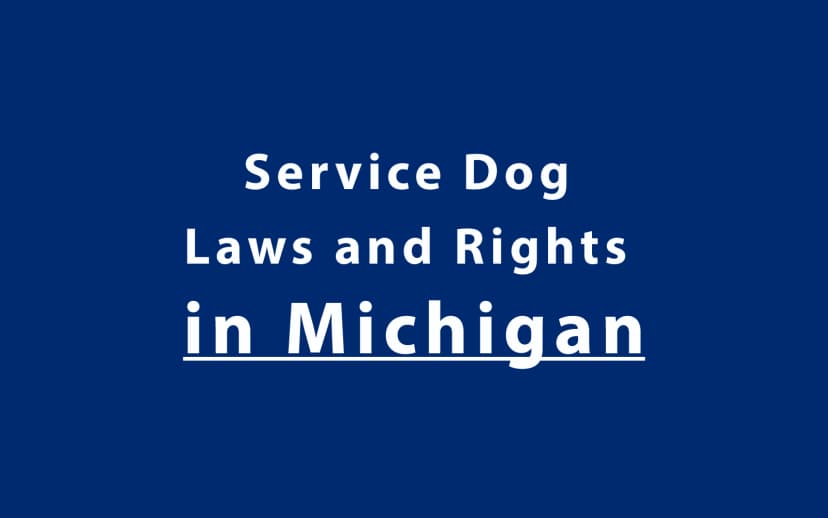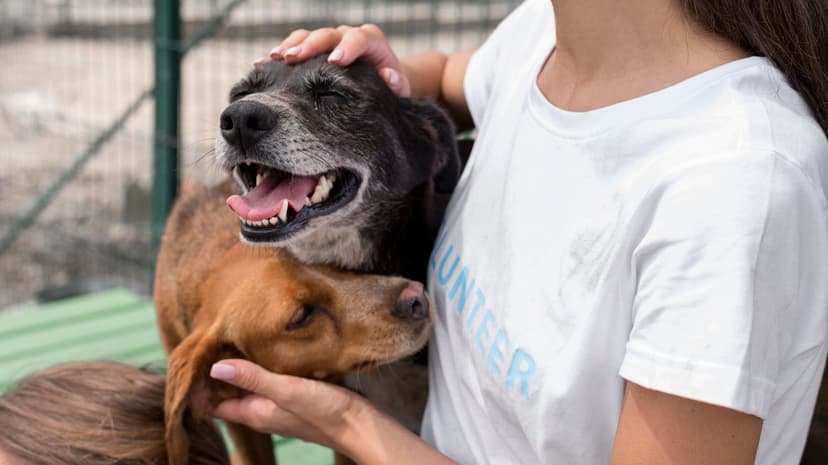Service Dog Laws and Rights in South Dakota

Service dogs are invaluable companions for individuals with physical, psychiatric, sensory, and neurological disabilities. Trained to perform specific, disability-related tasks, service dogs empower their handlers to live independently and confidently. In South Dakota, both federal and state laws protect the rights of service dog handlers, ensuring equitable access to housing, public spaces, transportation, employment, and education.
This guide provides a detailed overview of the service dog laws in South Dakota, helping handlers, business owners, landlords, and educators understand their responsibilities and rights.
What Qualifies as a Service Dog in South Dakota
A service dog, according to the Americans with Disabilities Act (ADA) and South Dakota law (SDCL Chapter 20-13), is a dog that is individually trained to perform tasks that mitigate a person’s disability. The state aligns with federal definitions, ensuring consistency across legal frameworks.
Examples of qualifying tasks include:
• Guiding individuals who are blind or visually impaired
• Assisting individuals with mobility impairments
• Alerting to seizures or blood sugar fluctuations
• Interrupting psychiatric episodes or self-harming behaviors
• Retrieving medication or providing grounding techniques
Important distinction: Emotional Support Animals (ESAs) and therapy animals are not considered service dogs, as they are not trained to perform specific tasks.
Public Access Rights in South Dakota
Under both ADA and South Dakota Codified Law § 20-13-23, individuals with disabilities accompanied by trained service dogs have the right to access all public accommodations.
Public access includes:
• Restaurants and grocery stores
• Public parks and museums
• Retail shops and malls
• Government buildings and libraries
• Hotels, lodgings, and healthcare facilities
Permitted questions staff may ask:
1. Is this a service animal required because of a disability?
2. What task has the animal been trained to perform?
Not allowed:
• Asking for documentation or ID
• Requesting a demonstration of the task
• Asking about the individual’s disability
Handler responsibilities:
• Maintain control using a harness, leash, or voice commands
• Ensure the dog is housebroken
• Remove the dog if it behaves disruptively or poses a threat
Businesses may deny access only if the dog is not under control or presents a health/safety risk.
Housing Rights in South Dakota
The Fair Housing Act (FHA) ensures that individuals with service dogs can live in housing where pets may otherwise be prohibited.
Key housing protections include:
• No pet fees, deposits, or breed/size restrictions for service dogs
• Landlords may request verification only if the disability or need for the dog is not obvious
Verification should:
• Be from a qualified healthcare provider
• Confirm the individual’s disability and need for the animal
Landlords cannot:
• Ask for training certificates or detailed medical records
• Delay tenancy due to accommodation requests
Violations can be reported to the U.S. Department of Housing and Urban Development (HUD) or the South Dakota Division of Human Rights.
Employment Rights in South Dakota
Title I of the ADA protects employees with disabilities from discrimination and allows them to request a reasonable accommodation—including the use of a service dog—in the workplace.
To request an accommodation:
1. Submit a written request to your employer or HR department
2. Provide medical documentation if your disability or need isn’t apparent
3. Engage in an interactive discussion with your employer
Employers must accommodate unless:
• It would cause an undue hardship
• The dog would disrupt the workplace or pose a safety risk
Complaints can be filed with the EEOC or the South Dakota Department of Labor and Regulation - Human Rights Division.
Travel and Transportation Rights
Air Travel: Under the Air Carrier Access Act (ACAA), trained service dogs may fly in the cabin of U.S. airlines free of charge.
Requirements include:
• Submitting the DOT’s Service Animal Transportation Form
• Maintaining control of the dog during the flight
• Ensuring the dog fits within the handler’s foot space
Public Transit in South Dakota:
Service dogs are allowed on public and private transportation systems, including:
• City buses (e.g., Sioux Falls Transit, Rapid Ride)
• Amtrak trains
• Rideshare services (Uber, Lyft)
• Taxis and intercity buses
Any denial of service dog access is a civil rights violation and may be reported to local transit authorities or the U.S. Department of Transportation.
Service Dogs in Educational Institutions
K–12 Schools
Students with disabilities in public schools are protected by IDEA and Section 504. South Dakota schools must permit service dogs when necessary to support a student’s educational experience.
Colleges and Universities
Postsecondary institutions must comply with the ADA and accommodate students using service dogs in:
• Dormitories
• Classrooms and labs
• Dining halls and libraries
Responsibilities:
• Handlers or guardians must care for the dog
• The school may not impose pet fees or require registration
Accommodation requests can be directed to the school’s Disability Services Office.
Service Dog Training and Registration in South Dakota
There is no legal requirement to register, certify, or professionally train a service dog in South Dakota. Owner-training is legal if the dog is reliably trained in public behavior and disability-specific tasks.
Why voluntary registration helps:
• Simplifies housing and travel situations
• Reduces conflict with businesses or landlords
• Offers peace of mind and visible identifiers (vests, ID cards)
AssistanceDogPartners.org provides:
• Online training courses
• Optional registration kits with ID and vests
Fraud and Misrepresentation
Under South Dakota Codified Law § 20-13-23.1, misrepresenting a pet as a service dog is a Class 2 misdemeanor.
Fraud includes:
• Using fake registration IDs or vests
• Claiming a non-task-trained animal is a service dog
• Passing off an ESA or therapy animal as a service dog
Penalties may include:
• Fines up to $500
• Community service or criminal charges
Violations can be reported to local law enforcement or the South Dakota Division of Human Rights.
Resources in South Dakota
• South Dakota Division of Human Rights – https://dlr.sd.gov/humanrights
• Disability Rights South Dakota – https://www.dr-sd.org
• SD Department of Human Services (DHS) – https://dhs.sd.gov
• Local training support in Sioux Falls, Rapid City, Brookings, Aberdeen
Frequently Asked Questions (FAQs)
Is service dog registration required in South Dakota?
No. It is optional and not required by law.
Can I train my own service dog?
Yes. As long as the dog is trained to perform tasks and behaves appropriately.
Are psychiatric service dogs protected?
Yes. If trained in tasks related to a disability, they are covered under the ADA.
Can a landlord or business request proof?
No. They can only ask the two ADA-compliant questions.
What if my service dog is denied access?
File a complaint with the U.S. DOJ, SD Human Rights Division, or local enforcement.
Conclusion
South Dakota enforces strong service dog protections aligned with federal law. Whether navigating public life, housing, education, or employment, handlers and their trained service dogs are legally protected.



